You’re at the point where something’s gotta change. Maybe it’s you. Maybe it’s someone you care about. Either way, life isn’t cutting it, and you’re looking up “Addiction Treatment Columbus Ohio” because therapy sounds like the way out, right?
You’re probably wondering:
- What does therapy actually do in Addiction Treatment Columbus?
- How long will this take? Weeks, months…years?
- Will it actually work, or will I just end up back at square one?
If this hits home, you’re in the right place. I’m gonna walk you through everything you can expect in Addiction Treatment Columbus in Columbus, Ohio. And this isn’t gonna be some sugar-coated pitch. We’re talking real, no-nonsense information because if you’re here, you don’t need fluff. You need answers.
So, What Is Addiction Treatment Columbus, Ohio?
Addiction Treatment Columbus isn’t just one thing. It’s a process. A mix of therapies, detox options, mental health support, and recovery programs that target every part of you—mind, body, and the parts you’re still figuring out.
At Ridgeline Recovery LLC, here’s what you’ll get:
- Therapy (the kind that actually gets results).
- Mental health support (you’d be surprised how much this impacts recovery).
- Recovery Planning (step-by-step, realistic, with accountability).
- Medication (if needed, to make this road a bit smoother).
Each piece here serves a purpose. And yeah, there’s a lot to it, but that’s because addiction is complex. Addiction Treatment Columbus Ohio is built to cover every part.
Breaking Down the Key Parts of Addiction Therapy
1. Detoxification: The Starting Line
Before you dive into any therapy, there’s often a detox phase. Think of this as hitting the reset button.
You may need a medical detox—which means you’re not doing this alone. You’ll have healthcare pros who know how to get you through the roughest parts of withdrawal.
Expect this in detox:
- Medical staff keeping tabs on your vitals and mood.
- Options for medication to ease symptoms.
- A focus on getting your body clean and stable before therapy kicks in.
It can feel like a fight because it is. But once detox is over, you’re in a stronger place for the work that comes next.
2. Therapy (This Is the Core of Addiction Treatment Columbus)
Therapy isn’t a one-size-fits-all. There’s a ton of different therapy types out there, but here’s what you’re likely to see at Ridgeline Recovery LLC.
Cognitive Behavioral Therapy (CBT)
CBT is about recognizing and challenging those negative thoughts and habits that fuel addiction.
Expect CBT to:
- Dig into the “why” behind your cravings.
- Teach you coping mechanisms for real-world situations.
- Help rewire your brain, focusing on healthier reactions.
Dialectical Behavior Therapy (DBT)
If emotions run high, DBT’s got your back. It’s a branch of CBT but with a twist, zeroing in on managing strong emotions.
DBT tackles:
- How to keep control when you feel overwhelmed.
- Ways to communicate without blowing up or shutting down.
- Strategies to get through tough spots without relapse.
3. Mental Health Support: More Important Than You Think
Addiction and mental health are connected. Addiction Treatment Columbus Ohio understands that without addressing issues like anxiety, depression, or trauma, you’re missing half the picture.
Dual Diagnosis: Addressing Mental Health and Addiction Together
This isn’t just for those with a mental health diagnosis. It’s for anyone whose mental well-being impacts their recovery.
What dual diagnosis covers:
- Anxiety or depression treatment, along with addiction support.
- Extra sessions with a mental health counselor to understand triggers.
- Tools to manage both mental health and sobriety.
4. Medication-Assisted Treatment (MAT)
Vivitrol clinics near me—you’ve probably seen this term if you’re in Ohio. MAT uses FDA-approved meds to curb cravings, making the process less of an uphill battle.
Types of Medication You Might Encounter:
- Vivitrol: Helps reduce alcohol and opioid cravings.
- Suboxone: Used in opioid addiction recovery.
- Antidepressants or anti-anxiety meds: For those with dual diagnoses.
With MAT and addiction therapy, you’re getting a two-part strategy—meds keep cravings at bay, while therapy works on the deeper stuff.
Sober Living Houses: Staying in the Right Environment
Ever heard of the “pink cloud” phase? It’s that first rush of feeling amazing after quitting, but it fades. Sober living houses are there to give you a stable place to live while you adjust to life without substances.
Here’s what to expect:
- A substance-free space with accountability.
- Supportive roommates who get it.
- A buffer between detox and the real world.
What to Know About the Twelve Steps
Yes, the Twelve Step program is part of many recovery plans. It’s about connecting to a community and having a roadmap for sobriety.
A few highlights:
- The AA Third Step: This is where you hand control over, not to lose control but to gain it.
- Support meetings: Build a network of people who understand.
- Accountability: You’re not in this alone; there’s always someone who’s got your back.
Addressing Alcoholism and Dementia Disease in Recovery
Long-term alcohol abuse? It has serious consequences, including cognitive decline. Many people ask, “Can alcohol start dementia?”
Yes, prolonged alcohol abuse can lead to symptoms that look a lot like dementia. Part of Addiction Treatment Columbus Ohio includes screening for these symptoms, offering support to help you rebuild mental strength.
What You Can Expect:
- Regular memory and cognitive tests.
- Exercises and therapy to boost brain health.
- Holistic support that tackles both addiction and potential cognitive issues.
FAQs: Your Questions Answered
Q: How long will I need to stay in treatment?
A: It varies. Detox can take days; therapy can take months. The goal is lifelong recovery, and that depends on what works for you.
Q: Is detox really that bad?
A: It can be tough, especially without medical support. That’s why Ridgeline Recovery LLC provides detox assistance with meds and medical care.
Q: Can I work while in treatment?
A: Outpatient programs let you balance treatment with work. But if you need inpatient care, you may need time off to focus 100% on recovery.
Q: Will I have to go cold turkey?
A: Not always. Medications like Vivitrol can ease the process, and doctors will work with you to find the safest way to quit.

Addiction Recovery Columbus: What Happens After Therapy?
Graduating from therapy doesn’t mean you’re on your own. Aftercare is part of addiction recovery Columbus, helping you stay on track after you leave the program.
Here’s what aftercare includes:
- Ongoing therapy sessions: To tackle new challenges.
- Check-ins with counselors: Keeps you accountable.
- Sober living options: Extra support if you’re transitioning.
You’re building a foundation, and aftercare is the framework that keeps it strong.
Get Started with Addiction Treatment Columbus
So, ready to start? No more searching “addiction therapy near me” or “mental health services near me.” You’ve got Ridgeline Recovery LLC here in Columbus, Ohio, with everything you need under one roof.
Here’s what you can expect from the first call:
- Consultation: You’ll talk to a counselor who gets it.
- Personalized Plan: Based on what you need, not a generic fix.
- Ongoing Support: Because real change isn’t overnight.
In Addiction Treatment Columbus Ohio, you’ll find the tools, guidance, and community you need to get on track and stay there. You’ve got the questions, we’ve got the answers, and this is where recovery begins.
Advanced Strategies in Addiction Treatment Columbus: Building Lasting Change
Addiction recovery isn’t a one-and-done deal. The journey from early sobriety to long-term stability involves many steps, strategies, and adjustments. Columbus offers robust, science-backed methods, and in Addiction Treatment Columbus, your approach is personalized to meet your evolving needs.
1. Integrated Treatment Models: A Holistic Approach
Addiction and mental health challenges are deeply intertwined. Integrated treatment combines care for addiction and mental health issues simultaneously, crucial for those with co-occurring disorders.
What Integrated Treatment Looks Like in Columbus:
- Dual Treatment Plans: Your care is equally divided between mental health and addiction recovery.
- Consistent Check-Ins with a Mental Health Therapist Near Me: Ongoing assessments to adjust your treatment plan based on your progress and new challenges.
- Mental Health Services: You’ll find support through resources like mental health clinics near me or mental health hospitals near me, providing crisis intervention when needed.
Columbus’s integrated model is not just about staying sober; it’s about creating an environment where both mental wellness and recovery grow stronger together.
2. Medication Management in Addiction Treatment Columbus
Medication-assisted treatment (MAT) is a powerful tool in Addiction Treatment Columbus. Medications like Vivitrol and Suboxone make recovery more manageable for those struggling with severe addiction.
What to Expect in Medication Management:
- Personalized Dosage and Administration: MAT isn’t a cookie-cutter approach. Vivitrol clinics near me in Columbus offer customized dosing plans based on your specific needs.
- Ongoing Monitoring: You’ll receive regular check-ins to assess your response to medications, adjusting as your body adapts.
- Combining Medication with Therapy: Medication alone doesn’t change behavior. That’s why MAT is part of a comprehensive addiction therapy and mental health therapy plan.
When done right, medication doesn’t just reduce cravings. It provides the stability needed to engage fully in therapy and recovery.
3. Cognitive and Behavioral Therapies in Addiction Treatment Columbus
Behavioral change lies at the core of Addiction Treatment Columbus in Columbus, and therapy offers targeted techniques for unlearning habits that drive addiction.
Cognitive Behavioral Therapy (CBT) and Addiction Recovery
CBT digs into thought patterns, reframing them to drive healthier behaviors.
Here’s how CBT works:
- Identifying Triggers: Pinpoint the thoughts that lead to cravings.
- Reframing Cravings: Learn strategies to view cravings as something manageable rather than overwhelming.
- Building New Habits: Replace destructive behaviors with constructive ones, reinforcing them through daily practice.
Dialectical Behavior Therapy (DBT) for Emotional Regulation
DBT addresses emotional swings that can derail recovery, providing tools for control and clarity. Addiction Treatment Columbus often integrates DBT for people who struggle with intense emotions.
Core Skills of DBT:
- Mindfulness: Becoming aware of the moment instead of reacting impulsively.
- Distress Tolerance: Strategies for handling stress without relapsing.
- Interpersonal Effectiveness: Communication skills to express needs without conflict.
4. Residential and Outpatient Treatment Options in Columbus
Whether you’re looking for inpatient rehabs near me or outpatient therapy, Columbus offers a range of Addiction Treatment Columbus near me options, each with its benefits and structure.
Residential Treatment
Residential treatment (or inpatient treatment) gives you 24/7 support and removes external triggers. For severe addiction cases, it’s a safe, structured environment to start the journey.
Benefits:
- Constant Access to Support: Therapists, counselors, and peers are always available.
- Routine and Structure: Structured days with scheduled therapy, activities, and downtime.
- Distance from Temptation: No access to triggers allows for full focus on recovery.
Outpatient Treatment
If you need flexibility, outpatient Addiction Treatment Columbus Ohio is ideal. It allows you to maintain family or work commitments while still receiving structured support.
What Outpatient Treatment Looks Like:
- Scheduled Therapy Sessions: Typically, these are intensive, with daily check-ins and group sessions.
- Accountability Programs: Regular drug testing and progress assessments to keep you on track.
- Real-World Application: You’ll be living in your usual environment, applying the skills learned in therapy in real-time.
Both options come with aftercare support, and Columbus makes sure every person in recovery finds the right fit for their lifestyle and needs.
5. The Importance of a Support Network in Recovery
Your environment is crucial for lasting recovery. Whether you stay in a sober living house near me or lean on family and friends, a support network can make a huge difference.
Sober Living Houses: Transitional Support
Sometimes, going from inpatient treatment straight back to life can be overwhelming. A sober living house offers a halfway point between treatment and full independence.
What to Expect in a Sober Living House:
- Peer Support: Housemates going through similar experiences.
- Structure and Accountability: Curfews, chores, and drug testing keep you on track.
- Safe Environment: No temptations; it’s a substance-free zone.
Building a Strong Personal Support Network
Support doesn’t just come from therapists and sober houses; it’s also about building positive relationships with people who encourage sobriety.
How to Strengthen Your Network:
- Rebuilding Family Ties: Family therapy can be a big help here, especially if relationships have been strained by addiction.
- Regular AA or NA Meetings: The twelve steps aren’t just about admitting powerlessness. It’s about finding power in the community.
- Stay Connected with a Sponsor: Sponsors offer accountability and support through the highs and lows of recovery.
6. Addressing Long-Term Challenges and Preventing Relapse
Relapse isn’t failure; it’s a risk. Addiction Treatment Columbus offers tools and strategies to recognize and prevent relapse before it happens.
Identifying High-Risk Scenarios
Everyone has unique triggers. Part of recovery is learning to spot them before they snowball.
Examples of High-Risk Situations:
- Emotional Stress: Arguments, grief, loneliness.
- Social Settings: Parties, reunions, or places where substances are present.
- Boredom: Lack of structure can lead to old habits creeping back in.
Using Coping Mechanisms Effectively
Coping mechanisms aren’t just nice-to-haves; they’re lifesavers in high-stress moments.
Top Coping Strategies in Addiction Recovery:
- Deep Breathing and Grounding Exercises: Bring yourself back to the present when cravings strike.
- Journaling: A safe way to release emotions and track your thoughts.
- Exercise: A great distraction and mood-booster that also helps with physical recovery.
7. Getting Help for the Underlying Health Issues
Health doesn’t stop at addiction recovery; many people face additional medical or psychological challenges.
Mental Health Clinics in Columbus
Issues like meth psychosis, ativan withdrawal symptoms, and gabapentin dependency aren’t uncommon. Columbus has mental health clinics near me that specialize in these areas, with therapists skilled in addiction recovery.
What You Can Expect in a Mental Health Clinic:
- Comprehensive Assessments: Finding any underlying health issues that may contribute to addiction.
- Specialized Treatment for Conditions Like Meth Psychosis: Customized care that goes beyond standard Addiction Treatment Columbus.
- Ongoing Monitoring: Routine check-ins to see how recovery is impacting your overall health.
Addressing Chronic Health Conditions in Recovery
Addiction and chronic health conditions often go hand-in-hand. Alcoholism and dementia disease is one such case. And yes, can alcohol start dementia? It absolutely can. Columbus addiction programs focus on treating the person as a whole, addressing both addiction and long-term health effects.
Addiction Treatment Columbus: Finding Long-Term Stability
Here’s the reality: Addiction Treatment Columbus isn’t a magic fix. But with the right tools, strategies, and mindset, it can lead to lasting change.
If you’re considering Ridgeline Recovery:
- Expect a straightforward plan with support every step of the way.
- Know that relapse prevention, family therapy, and dual diagnosis care are all part of the package.
- Trust that Columbus addiction recovery is about empowering you, not just taking away substances.
Effective Paths to Freedom: Advanced Methods in Addiction Treatment Columbus
The path to true recovery isn’t just about quitting a substance. It’s about reshaping how you handle life’s pressures, reconnecting with purpose, and establishing boundaries that protect your well-being. Here in Columbus, the approach goes beyond typical treatment to tackle recovery as a comprehensive life overhaul.
1. Building Resilience and Emotional Stability in Recovery
One of the most important but often overlooked aspects of Addiction Treatment Columbus is developing emotional resilience. Resilience isn’t something you either have or don’t; it’s built over time and can drastically influence your long-term sobriety.
Steps to Building Emotional Resilience in Columbus Recovery Programs
- Mindfulness Practices: Programs in Columbus increasingly integrate mindfulness as a core skill, helping you become more aware of triggers without reacting impulsively.
- Emotional Regulation Therapy: Techniques like grounding exercises and cognitive restructuring help you maintain control even during intense moments of craving.
- Engagement with a Mental Health Therapist Near Me: Regular therapy sessions, whether through mental health services near me or more targeted addiction therapy services, allow for continuous improvement in handling life’s challenges.
2. Specialized Programs for Specific Needs in Addiction Treatment Columbus
While some people benefit from broad approaches, others need treatment geared specifically to their background and challenges.
Tailored Treatment Programs
In Columbus, programs are built to meet diverse needs, recognizing that addiction has various forms and underlying factors:
For First Responders
First responders often face intense stress and trauma that make them susceptible to addiction. Programs tailored to this group provide counseling specific to trauma and mental health help near me for those facing anxiety or PTSD.
Gender-Specific Programs
Recovery dynamics can differ based on gender. Columbus offers co-ed rehab in Ohio that accommodates different needs, including those accepting Medicaid, focusing on empowerment, respect, and peer support that aligns with your unique experiences.
LGBTQ+ Support
Recognizing unique struggles, Columbus includes LGBTQ+-focused addiction therapy, ensuring that people receive both emotional and identity-specific support, increasing comfort and engagement with the program.

3. Family Dynamics in Recovery: Rebuilding and Restoring Relationships
Addiction doesn’t just impact the individual; it disrupts families. Addiction Treatment Columbus brings family into the process, acknowledging them as a crucial support system.
How Family Support Works in Columbus
Family Therapy Sessions
Incorporating loved ones into therapy provides an outlet to address misunderstandings, rebuild trust, and ensure everyone is on the same page for long-term recovery. Through these sessions, families learn how best to support recovery without enabling old behaviors.
Education Programs for Families
For families dealing with loved ones in recovery, it’s essential to understand addiction’s complexities. Many centers provide resources to educate family members, covering:
- Substance Abuse 101: Understanding the science behind addiction and the reasons it can be so challenging to overcome.
- The Do’s and Don’ts of Support: Guidelines for supporting someone in recovery without becoming an enabler.
- Recognizing Pink Clouding: When individuals in early sobriety feel overly optimistic, thinking recovery will be easy, which can lead to relapse. Family members learn to spot these warning signs and offer balanced support.
4. Physical Health: A Key Component in Columbus Addiction Treatment Columbus
While emotional and mental health are vital, physical health plays an equally crucial role. Recovery is tough on the body, and Addiction Treatment Columbus prioritizes physical restoration as part of comprehensive care.
Managing Withdrawal Symptoms
Withdrawal is often the first hurdle in addiction recovery, and Columbus centers are well-equipped to provide safe detox options:
- Medical Detox Near Me: Supervised facilities help manage severe symptoms that can come from substances like alcohol, opioids, or benzodiazepines.
- Withdrawal from Specific Substances: For instance, ativan withdrawal symptoms can be severe, requiring professional guidance. Columbus’s detox centers have staff trained to manage these risks with minimal discomfort.
Nutritional Counseling and Exercise Programs
Physical health also means rebuilding the body’s strength and resilience:
- Nutritional Therapy: Programs teach you how to fuel your body properly, correcting nutrient deficiencies caused by prolonged substance use.
- Exercise Therapy: Releasing endorphins through exercise provides natural mood boosts, essential for anyone overcoming substances that impact dopamine production.
5. Accountability Structures for Long-Term Success
Relapse is part of the journey for many, but with the right support structures in place, you can lower those risks significantly.
Accountability Programs in Columbus
Sober Companions
If you feel your environment is challenging, sober companions can provide direct support, offering real-time guidance and companionship through triggering situations.
Regular Check-Ins and Drug Testing
Maintaining sobriety often requires tangible accountability. Frequent check-ins with addiction therapists or random drug testing can keep you focused, allowing you to measure progress and commit to your recovery goals.
Group Therapy and AA Meetings
The twelve steps in the twelve-step program give many individuals a roadmap for self-accountability. Whether you’re attending AA meetings for alcohol dependency or another group, being around like-minded people reinforces the work you’re putting in.
6. Mental Health Support Beyond Substance Abuse
Addressing mental health isn’t a “side effect” of recovery; it’s often at the core of Addiction Treatment Columbus. Columbus addiction centers know that supporting mental health is a crucial piece of sustaining sobriety.
Conditions Like Meth Psychosis or Alcohol-Induced Dementia
Some substances have profound, long-term impacts on the brain. Meth psychosis can affect cognitive function long after meth use stops, while chronic alcohol use can lead to alcoholism and dementia disease.
Here’s how Columbus addresses these challenges:
- Specialized Mental Health Clinics: For cases like gabapentin dependency or alcohol-related dementia, specialized clinics address these issues alongside Addiction Treatment Columbus, ensuring comprehensive care.
- Mental Health Therapist Near Me Options: Skilled therapists are available to provide both individual and group counseling that addresses mental health beyond addiction alone.
7. Vocational Training and Job Support Programs
Transitioning back to a regular life requires more than sobriety; it often involves finding purpose and financial independence. In Addiction Treatment Columbus, this includes equipping you with tools for meaningful employment.
Why Employment Support Matters in Recovery
Returning to work or finding a job can be daunting, especially with gaps on your resume or skills affected by addiction. But Columbus offers vocational training as part of your recovery program, helping you gain the skills you need to thrive independently.
Skills Training Programs
If you’re looking to learn new skills, these programs often cover everything from resume writing to hands-on training in high-demand fields, giving you confidence to build a new path forward.
Employment Assistance Programs
Programs can link you with job opportunities aligned with your recovery goals. Employment can be stabilizing, giving you purpose, financial security, and a supportive community.
8. Substance-Specific Treatment Programs: From Alcohol to Prescription Medications
Addiction is rarely limited to a single substance, and Columbus ensures each treatment plan considers the specific challenges each substance presents.
Alcohol Dependency Programs
Alcohol recovery is nuanced, especially with severe cases that may involve symptoms like DTS alcohol or the potential for alcohol-induced dementia.
What to expect from alcohol-focused treatment:
- Alcohol Rehab Centers and Detox Options: Inpatient or outpatient settings provide resources to quit safely, addressing symptoms like ativan withdrawal symptoms for those using benzodiazepines alongside alcohol.
- Rehab for Alcoholics and Sober Living Houses: Residential options provide a structured environment that’s crucial during the early stages of recovery.
Prescription Medication Dependency
Prescription medications like gabapentin or xanax bring specific challenges due to their legal status and often hidden dependencies.
- Medical Detox Near Me for Prescription Drugs: Qualified clinics understand the delicate nature of prescription withdrawal and can guide you safely off these medications.
9. Utilizing Aftercare to Prevent Relapse
Treatment is a milestone, but aftercare is where the long-term work begins. The best Addiction Treatment Columbus programs invest in aftercare to keep you on track.
Aftercare Program Elements
Aftercare isn’t just a phone call once a week. It’s a structured plan that involves everything from ongoing therapy to support groups.
What to Expect:
- Weekly Therapy Sessions: Regular contact with a mental health therapist near me can address new challenges as they arise.
- Support Groups and AA/NA Meetings: Continuous connection with the sober community is critical. The AA third step reminds you to surrender control, leaning on your support network to stay focused.
- Continued Drug Testing: Sometimes, accountability needs structure. Random testing as part of aftercare can provide an additional layer of motivation.
Ready to Start? Addiction Treatment Columbus Can Help
It’s clear: Addiction Treatment Columbus isn’t a temporary fix. It’s a comprehensive program that prioritizes your whole well-being. From specialized mental health support to tailored job training, Columbus’s treatment centers are built to support every phase of your recovery.
Your future is waiting, and so is the support you need to achieve it.
Call Us Now!
If you or a loved one is struggling with heroin or alcohol dependency, reach out to Ridgeline Recovery Center in Columbus, Ohio, today. At Ridgeline Recovery, we offer a path to hope and healing. Our comprehensive Addiction Recovery services include Addiction Therapy, Addiction Treatment, Vivitrol Clinic and specialized Mental Health Services designed to support your journey to recovery.
We provide Aftercare Programs and Peer Support to ensure you have ongoing assistance after treatment. Our dedicated team offers Case Management and Child Services for those needing extra support. For individuals who prefer a faith-based approach, we offer Faith-Based Recovery options.
Our programs feature Group and Individual Counseling, along with Medication-Assisted Treatment (MAT) to address your unique needs. We also have an Intensive Outpatient Program (IOP) and a Partial Hospitalization Program (PHP) for more structured care.
Our team includes Registered Nurse Services, Psychiatric Services, and Therapeutic Behavioral Services (TBS) to provide comprehensive support throughout your recovery process. We work with various Insurance Coverage plans to help you access the care you need.
Don’t wait—contact us now to start your journey toward a brighter future with Ridgeline Recovery.
For more stories and information Contact Us, visit our Blog page and Stories & Highlights.







